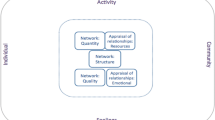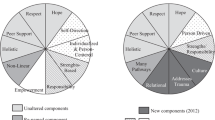Abstract
Evidence for a bi-directional relationship of depression and type 2 diabetes suggests that social distress plays a role in depression among people with diabetes. In this study, we examine the relationship between subjective distress and depression in 121 first- and second-generation Mexican immigrant women seeking diabetes care at a safety-net hospital in Chicago. We used a mixed-methods approach including narrative interview, survey, and finger-stick blood HbA1c data. Using grounded theory analysis, we identified seven life stressors from narrative interviews: interpersonal abuse, stress related to health, family, neighborhood violence, immigration status, and work, and feeling socially detached. Women reported unusually high rates of interpersonal abuse (65%) and disaggregated physical abuse (54%) and sexual abuse (23%). We evaluated depression using CES-D cut-off points of 16 and 24 and assessed rates to be 49 and 34%, respectively. We found that interpersonal abuse was a significant predictor of depression (CESD ≥ 24) in bivariate (OR 3.97; 95% CI 1.58–10.0) and multivariate (OR 5.51; 95% CI 1.85, 16.4) logistic regression analyses. These findings suggest that interpersonal abuse functions as an important contributor to depression among low-income Mexican immigrant women and should be recognized and addressed in diabetes care.

Similar content being viewed by others
References
Abraido-Lanza, A., M. Chao, et al. (2005). “Do healthy behaviors decline with greater acculturation? Implications for the Latino mortality paradox.” Social Science and Medicine 61(6): 1243-1255.
Alderete, E., W. Vega, et al. 2000a Effects of Time in the United States and Indian Ethnicity on DSM-III-R Psychiatric Disorders among Mexican Americans in California. Journal of Nervous and Mental Disease 188(2): 90–100.
Alderete, E., W. Vega, et al. 2000b Lifetime Prevalence of and Risk Factors for Psychiatric Disorder among Mexican Migrant Farm Workers in California. American Journal of Public Health 90(4): 608–614.
Allegria, M., G. Canino, et al. (2008). “Prevalence of mental illness in immigrant and non-immigrant U.S. Latino Groups.” The American Journal of Pyschiatry 165(3): 359-369.
Allegria, M., N. Mulvaney-Day, et al. (2007). “Prevalence of psychiatric disorders across Latino subgroups in the United States.” American Journal of Public Health 97(1): 68-75.
Baker, C., F. Norris, et al. (2005). “Violence and PTSD in Mexico: gender and regional differences.” Social Psychiatry and Psychiatric Epidemiology 40(7): 519-528.
Baker, C., and F. Norris, et al. 2009 Childhood Trauma and Adulthood Physical Health in Mexico. Journal of Behavioral Medicine (pub online 28 Jan).
Benson, M. L., J. Wooldredge, et al. (2004). “The Correlation between Race and Domestic Violence is Confounded with Community Context.” Social Problems 51(3): 326-342.
Black, S. (1999). “Increased health burden associated with comorbid depression in older diabetic Mexican Americans. Results from the Hispanic Established Population for the Epidemiologic Study of the Elderly survey.” Diabetes Care 22(1): 56-64.
Bourgois, P. 2009 Recognizing Invisible Violence. In Global Health in Times of Violence. B. Rylko-Bauer, L. Whiteford, and P. Farmer, eds., pp. 17–40. Santa Fe, NM: School for Advanced Research Press.
Burnam, M., R. Hough, et al. (1987). “Acculturation and lifetime prevalence of psychiatric disorders among Mexican Americans in Los Angeles.” Journal of health and social behavior 28: 89-102.
Castañeda, H. (2010). “Im/migration and Health: Conceptual, Methodological, and Theoretical Propositions for Applied Anthropologyby.” Annals of Applied Anthropology (Formerly NAPA Bulletin) 34(1): 6–27.
Cowie, C. C., K. F. Rust, et al. (2010). “Prevalence of Diabetes and High Risk for Diabetes using A1C Criteria in the U.S. Population in 1988-2006.” Diabetes Care 33(3): 562-568.
Cueller, I., B. Arnold, et al. (1995). “Acculturation rating scale for Mexican Americans II.” Hispanic Journal of Behavioral Sciences 17(3): 275-304.
deGroot, M., R. J. Anderson, et al. (2001). “Association of Depression and Diabetes Complications: A Meta-Analysis.” Psychosomatic Medicine 63: 619-630.
deGroot, M., B. Pinkerman, et al. (2006). “Depression treatment and satisfaction in a multicultural sample of type 1 and type 2 diabetic patients.” Diabetes Care 29: 549-553.
Dohrenwend, B. S., M. Dodson, et al. (1984). “Symptoms, Hassles, Social Supports, and Life Events: Problem of Confounded Measures.” Journal of Abnormal Psychology 93(2): 222-230.
Dong, M., R. F. Anda, et al. (2004). “The interrelatedness of multiple forms of childhood abuse, neglect, and household dysfunction.” Child Abuse and Neglect 28(7): 771-784.
Escobar, J.I., C. Hoyos Nervi, et al. 2000 Immigration and Mental Health: Mexican Americans in the United States. Harvard Review of Psychiatry 8: 64–72.
Felitti, V. J., R. F. Anda, et al. (1998). “Relationship of childhood abuse and household dysrunction to many of the leading causes of death in adults.” American Journal of Preventive Medicine 14: 245-258.
Finkler, K. (1994). Women in Pain: Gender and Morbidity in Mexico. Philadelphia, University of Philadelphia Press.
Finkler, K. (1997). “Gender, Domestic Violence and Sickness in Mexico.” Social Science and Medicine 45(8): 1147-1160.
Fisher, L., C. Chesla, et al. (2001). “Contributors to depression in Latino and European American patients with type 2 diabetes.” Diabetes Care 24: 1751–1757.
Fisher, L., M. Skaff, et al. (2008). “A longitudinal study of affective and anxiety disorders, depressive affect and diabetes distress in adults with Type 2 diabetes.” Diabetic Medicine 25(9): 1096-1101.
Gerst, K., M. Al-Ghatrif, et al. (2010). “High depressive symptomatology among older community-dwelling Mexican-Americans: The impact of immigration.” Aging Mental Health 14(3): 347-354.
Golden, S. H., B. L. H. Chang, et al. (2007). “Depression and Type 2 Diabetes Mellitus: The Multiethnic Study of Atherosclerosis.” Psychosomatic Medicine 69: 529-536.
Golden, S., M. Lazo, et al. (2008). “Examining a bidirectional association between depressive symptoms and diabetes.” Journal of the American Medical Association 299(23): 2751-2759.
Gonzalez, H.M., W. Tarraf, et al. 2010 The Epidemiology of Major Depression and Ethnicity in the United States. Journal of Psychiatric Research (epub 1–6).
Gutmann, M.C. 1999 Ethnicity, Alcohol, and Acculturation. Social Science & Medicine 48: 173–184.
Heilemann, M. V., F. S. Kury, et al. (2005). “Trauma and Posttraumtaic Stress Disorder Symptoms among Low Income Women of Mexican Descent in the United States.” The Journal of Nervous and Mental Disease 193(10): 665-672.
Hirsch, J. (2003). A Courtship After Marriage: Sexuality and Love in Mexican Transnational Families. Berkeley, University of California Press.
Holman, E. A., R. C. Silver, et al. (2000). “Traumatic Life Events in Primary Care Patients: A Study in an Ethnically Diverse Sample.” Archives of Family Medicine 9(9): 802-810.
Hovey, J. (2000). “Acculturative Stress, Depression and Suicidal Ideation in Mexican Immigrants.” Cultural Diversity and Ethnic Minority Psychology 6(2): 134-151.
Knol, M., J. Twisk, et al. (2006). “Depression as a risk factor for the onset of type 2 diabetes mellitus. A meta-analysis.” Diabetologia 49(5): 837–845.
Lara, M., C. Gamboa, et al. (2005). “Acculturation and Latino Health in the United States: A Review of the Literature and its Sociopolitical Context.” Annual Review of Public Health 26: 367-397.
Lown, E. A. and W. A. Vega (2001). “Prevalence and Predictors of Physical Partner Abuse Among Mexican American Women.” American Journal of Public Health 91(3): 441-445.
McCarter, R., J. Hempe, et al. 2006 Mean Blood Glucose and Biological Variation have Greater Influence on HbA1c Levels than Glucose Instability. Diabetes Care 29: 352–355.
Mendenhall, E., R. Seligman, et al. (2010). “Speaking through Diabetes: Rethinking the Significance of Lay Discourses on Diabetes.” Medical Anthropology Quarterly 24(2): 220-239.
Moscicki, E., B. Locke, et al. (1989). “Depressive symptoms among Mexican Americans: The Hispanic Health and Nutrition Examination Survey.” American Journal of Epidemiology 130: 348–360.
Pan, A., M. Lucas, et al. (2010). “Bidirectional Association Between Depression and Type 2 Diabetes Mellitus in Women.” Archives of Internal Medicine 170(21): 1884-1891.
Peterson, K., J. Pavlovich, et al. (1998). “What is hemoglobin A1c? An analysis of glycated hemoglobins by electrospray ionization mass spectrometry.” Clinical Chemistry 44(9): 1951-1958.
Polonsky, W.H., L. Fisher, et al. 2005 Assessing Psychosocial Distress in Diabetes. Diabetes Care 28: 626–631.
Pouwer, F., N. Kupper, et al. (2010). “Does Emotional Stress Cause Type 2 Diabetes Mellitus? A Review from the European Depression in Diabetes EDID Research Consortium.” Discovery Medicine 9(45): 112-118.
Radloff, L. S. (1977). “The CES-D Scale.” Applied Psychological Measurement 1(3): 385-401.
Rock, M. (2003). “Sweet Blood and Social Suffering: Rethinking Cause-Effect relationships in Diabetes, Distress and Duress.” Medical Anthropology 22: 131-174.
Smith, M. V., K. Poschman, et al. (2006). “Symptoms of Posttraumatic Stress Disorder in a Community Sample of Low-Income Pregnant Women.” American Journal of Psychiatry 163: 881-884.
Soler, J., V. Perez-Sola, et al. (1997). “Validation Study of the Center for Epidemiological Studies-Depression of a Spanish population of patients with affective disorders.” Actas Luso Esp Neurol Psiquiatr Cienc Afines 25(4): 243-249.
Stern, M., C. Gonzalez, et al. (1992). “Genetic and environmental determinants of type II diabetes in Mexico City and San Antonio.” Diabetes 41(4): 484-492.
Strauss, A. L. and J. M. Corbin (1990). Basics of Qualitative Research: Grounded Theory Procedures and Techniques. Newbury Park, CA, Sage.
Talbot, F. and A. Nouwen (2000). “A Review of the Relationship between Depression and Diabetes in Adults: Is There a Link?” Diabetes Care 23(10): 1556-1562.
Vega, W., B. Kolody, et al. (1986). “Depressive Symptoms and Their Correlates Among Immigrant Mexican Women in the United States.” Social Science & Medicine 22(6): 645-652.
Vega, W. A., B. Kolody, et al. (1998). “Lifetime prevalence of DSM-III-R psychiatric disorders among urban and rural Mexican Americans in California.” Archives of General Psychiatry 55: 771-778.
Vega, W., A. Ang, et al. (2011). “Neighborhood protective effects on depression in Latinos.” American Journal of Community Psychology 47(1-2): 114-126.
Watson, D. and L. A. Clark (1984). “Negative Affectivity: The Disposition to Experience Aversive Emotional States.” Psychological Bulletin 96(3): 465-490.
Weiner, S., A. Schwartz, et al. (2007). “Evaluating physician performance at individualizing care: a pilot study tracking contextual errors in medical decision making.” Medical Decisiom Making 27: 726-734.
Weiner, S. J., A. Schwartz, et al. (2010). “Contextual Errors and Failures in Individualizing Patient Care.” Annals of Internal Medicine 153(2): 69-75.
Acknowledgment
The authors wish to thank the women at John H. Stroger, Jr. Hospital of Cook County for participating in this study and sharing so openly their stories. In addition, thank you to the staff at the GMC for providing support and space for this study amidst their busy schedules. Thank you to Erin P. Finley and Kenneth Maes for reading early drafts of the manuscript and to the anonymous reviewers for their insightful comments. Emily Mendenhall was supported by the National Science Foundation (Grant #1024116), Cells to Society at Northwestern University, and The Graduate School at Northwestern University. We are also grateful to the Russell Sage Foundation because they supported Dr. Elizabeth Jacob and the preliminary work that inspired this study.
Author information
Authors and Affiliations
Corresponding author
Rights and permissions
About this article
Cite this article
Mendenhall, E., Jacobs, E.A. Interpersonal Abuse and Depression Among Mexican Immigrant Women with Type 2 Diabetes. Cult Med Psychiatry 36, 136–153 (2012). https://doi.org/10.1007/s11013-011-9240-0
Published:
Issue Date:
DOI: https://doi.org/10.1007/s11013-011-9240-0




